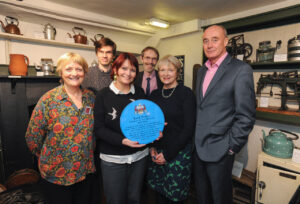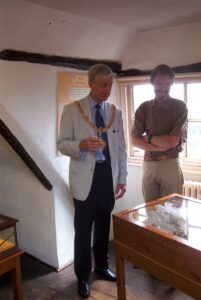Lucy Walker, chair of trustees
Allan was an inspiring colleague and friend. He was generous with his time and with sharing his passion for local history which he turned into something way beyond what most people think of as local history. He combined it with his interest in the building of communities and the provision of housing and amenities for all. This interest was at the core of his research and also his wonderful walking tours of Cambridge, explaining the whys and wherefores of our different city neighbourhoods.
I worked with Allan as a co-founder of the Mill Road History Project and Society, where he was valued by researchers for his guidance and encouragement, for sharing his expertise, and for writing several very significant reports of places along Mill Road. He remained a key member of the Mill Road History Society committee, always attending and contributing to meetings and talks. I also knew him in the context of City Council housing, environment and planning matters when I was a City Councillor: he was always willing to engage and, when necessary, ready to challenge but in the nicest possible way.
As a road sweeper for many years Allan got to know Cambridge extremely well. He loved the city and its buildings and valued the green spaces, trees, meadows and parks. He was a great advocate for quality of place that was accessible to all and was very involved in planning issues, particularly in Romsey, his local ward. He became well known for his well-researched building reports, and his skills in making a very articulate case for the preservation or careful development of a particular site or place. He was passionate about the need for quality family houses with gardens.
Allan was known to so many people and had the wonderful skill of finding things to connect with everyone. He had a great sense of humour, and his friendly smile and manner was infectious. So many people think of him as a friend. We will all miss him.
Sarah Ingram, former chair of trustees
When I first met Allan properly, as a new trustee at the Museum of Cambridge, I was in awe of him and his mighty reputation, and I was worried that I wouldn’t measure up. I’d met him briefly before – he’d led a workshop I’d attended for Open Cambridge on how to deliver a tour or a talk and he’d been captivating and funny and made it seem like the most natural thing in the world – and I’d also seen him in public debate and had been blown away by his confidence, knowledge and eloquence. So, becoming a trustee at the Museum of Cambridge and actually working with this legend was a big deal! I needn’t have worried. If he’d known I was in awe of him he would have laughed.
There was no arrogance to Allan; he was more interested in feeding his immense curiosity than his ego. For a long time it was our habit to repair to the Punter after board meetings and over a drink and several bowls of chips we’d talk animatedly about what amazing things the Museum could be and do if only there was the money. There was no limit to Allan’s enthusiasm!
When I became chair Allan was tremendously supportive and loyal through difficult times. He was also the most entertaining speaker. As chair, it was often my lot to introduce a talk, an exhibition, an event, but if Allan was present, I was more than happy to hand over to him because I knew his introduction – like his famous tours – would be informative, witty, and often irreverent, and would be delivered with passion and panache. He made you care. Cambridge will miss that.

